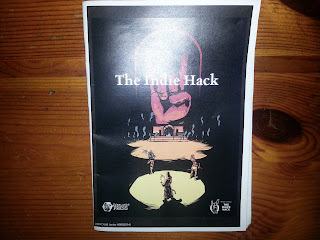Sunday, 25 September 2016
All about the Hack - The Indie, Cthulhu, and Jack Hacks
When the Black Hack came out, it sent a good number of waves out into the world with the ideas that it generated, and from it rose a number of inspired products that covered other types of games, rather than the standard fantasy genre that the original Hack covered.
Given the nature of the Black Hack, each of the new hacks is working towards making the type of game they cover easier to run whilst keeping the feel of the game in question. To do this, they present the basics of the rules boiled down to the essentials, and then make them interesting to play.
Today I'm looking at The Indie Hack, The Cthulhu Hack, and the Jack Hack...
Bear in mind that with each of these, you do still need the OSR rules to work with, mainly for the run of the mill things like creatures and weapon stats, although most of these books have stat blocks and character information for the bits that they cover in detail. Something that was introduced in the Black Hack was the concept of Usage Dice, which add to the results that are rolled and are slowly degraded in ability and discarded when overused, each of these new Hacks has a particular slat on their Usage Dice, which I'll come to in each review.
First up is the Cthulhu Hack
Paul Baldowski's epic release that covers in 22 pages what the main CoC rulebook takes a few hundred to do, the version that I have was one of the first ones, with the original cover artwork.
The Cthulhu Hack works with the regular OSR statistics, but the Usage dice for this hack are Flashlights and Smokes (keeping with the 1920's) to get the ideas flowing. Flashlights are for finding Physical clues, Smokes are for looking into Social clues. When you're out of dice, you're out of ideas, burned out, you've got to do something to get yourself back on track, and as a mechanic, it reminds you that you're not as indefatigable as the creatures you're up against, which I really like.
There are character archetypes and rules on sanity, not massively involved like others you may have seen, but faster and easier, with less chance of a character being permanently retired as a result of something bad happening.
It makes for an excellent swift game of horror, and as Paul keeps evolving it, it's well worth picking up.
Next up is the Indie Hack.
Slade Stolar's inspired look at putting in the narrative elements of modern gaming into the OSR world of solid crunch has a lot going for it, not least of which being...
Colour...
It also has a simple numerical mechanism for making the character better at some things whilst making them worse at others and also rules for generating relationships between characters so that they can assist each other. Characters don't have to accept the help that they get, but there are options, something that was never present in the OSR. It's not the same as Usage Dice, but it does make for an interesting change.
What it also has is more character types and creatures than either of the other Hacks, so there's lots of choice to work with, and there's a lot of artwork in there that's nicely suited to the product, even if it is in colour (get back all you purists...)
Liked the ideas presented, and if OSR had had something along these lines way back in the day, the face of modern gaming might have been very much different from what it is now.
Finally there's the Jack Hack
John R Davis takes a look at the world of Victorian horror, with an interesting take on the idea of morality in the form of White and Black usage dice. The White usage dice carries with it no inherent risk, The Black carries the possibility of having psychological consequences when used. While no one would want to take the risks if they have the choice, when the white die is exhausted, or at the GM's discretion, the Black can (or must) be used.
It's a simple mechanic, and it's simplicity makes it easy to consider using till you see all the negatives that can come from using it. It doesn't take much for a downwards slide to begin, and then your characters are in a world of hurt...
The rest of the book is hooks, locations, prompts, and plots, as well as a whole field of NPC's to work with. It doesn't leave much on the setting beyond the notation that you're in Whitechapel, but if you're playing RPG's, it's almost a certainty that you read books and stories, so the genre is well enough (in my opinion) to be assumed.
And if not, watch a season of Penny Dreadful, more than enough information there to keep you going forever...
All three hacks are available from Drivethru for less than the price of a happy meal from Mcdonalds...
If I didn't already have them, I'd skip dinner tomorrow...






